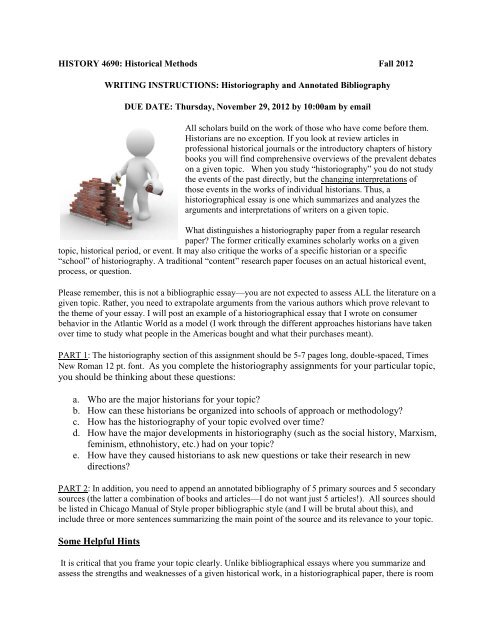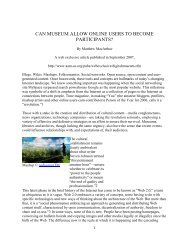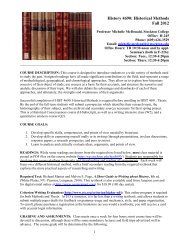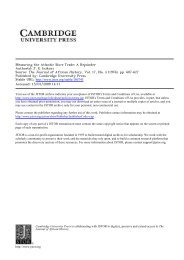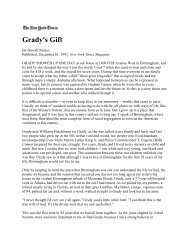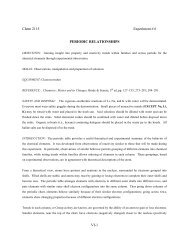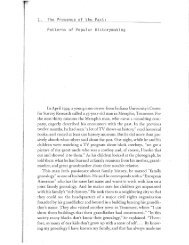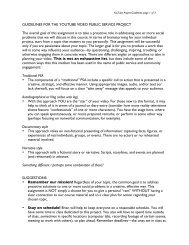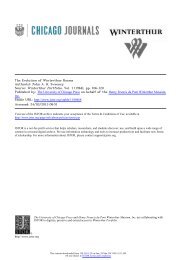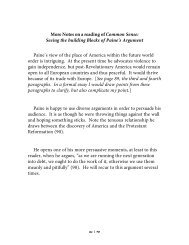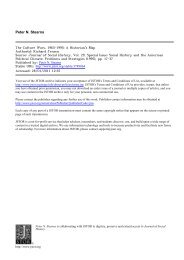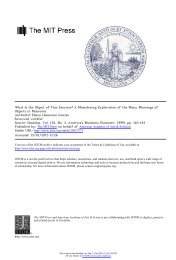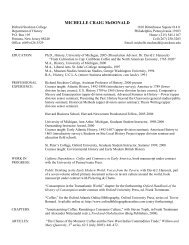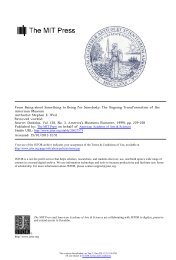a pdf of the assignment instructions for the historiography and ...
a pdf of the assignment instructions for the historiography and ...
a pdf of the assignment instructions for the historiography and ...
You also want an ePaper? Increase the reach of your titles
YUMPU automatically turns print PDFs into web optimized ePapers that Google loves.
HISTORY 4690: Historical Methods Fall 2012<br />
WRITING INSTRUCTIONS: Historiography <strong>and</strong> Annotated Bibliography<br />
DUE DATE: Thursday, November 29, 2012 by 10:00am by email<br />
All scholars build on <strong>the</strong> work <strong>of</strong> those who have come be<strong>for</strong>e <strong>the</strong>m.<br />
Historians are no exception. If you look at review articles in<br />
pr<strong>of</strong>essional historical journals or <strong>the</strong> introductory chapters <strong>of</strong> history<br />
books you will find comprehensive overviews <strong>of</strong> <strong>the</strong> prevalent debates<br />
on a given topic. When you study “<strong>historiography</strong>” you do not study<br />
<strong>the</strong> events <strong>of</strong> <strong>the</strong> past directly, but <strong>the</strong> changing interpretations <strong>of</strong><br />
those events in <strong>the</strong> works <strong>of</strong> individual historians. Thus, a<br />
historiographical essay is one which summarizes <strong>and</strong> analyzes <strong>the</strong><br />
arguments <strong>and</strong> interpretations <strong>of</strong> writers on a given topic.<br />
What distinguishes a <strong>historiography</strong> paper from a regular research<br />
paper? The <strong>for</strong>mer critically examines scholarly works on a given<br />
topic, historical period, or event. It may also critique <strong>the</strong> works <strong>of</strong> a specific historian or a specific<br />
“school” <strong>of</strong> <strong>historiography</strong>. A traditional “content” research paper focuses on an actual historical event,<br />
process, or question.<br />
Please remember, this is not a bibliographic essay—you are not expected to assess ALL <strong>the</strong> literature on a<br />
given topic. Ra<strong>the</strong>r, you need to extrapolate arguments from <strong>the</strong> various authors which prove relevant to<br />
<strong>the</strong> <strong>the</strong>me <strong>of</strong> your essay. I will post an example <strong>of</strong> a historiographical essay that I wrote on consumer<br />
behavior in <strong>the</strong> Atlantic World as a model (I work through <strong>the</strong> different approaches historians have taken<br />
over time to study what people in <strong>the</strong> Americas bought <strong>and</strong> what <strong>the</strong>ir purchases meant).<br />
PART 1: The <strong>historiography</strong> section <strong>of</strong> this <strong>assignment</strong> should be 5-7 pages long, double-spaced, Times<br />
New Roman 12 pt. font. As you complete <strong>the</strong> <strong>historiography</strong> <strong>assignment</strong>s <strong>for</strong> your particular topic,<br />
you should be thinking about <strong>the</strong>se questions:<br />
a. Who are <strong>the</strong> major historians <strong>for</strong> your topic?<br />
b. How can <strong>the</strong>se historians be organized into schools <strong>of</strong> approach or methodology?<br />
c. How has <strong>the</strong> <strong>historiography</strong> <strong>of</strong> your topic evolved over time?<br />
d. How have <strong>the</strong> major developments in <strong>historiography</strong> (such as <strong>the</strong> social history, Marxism,<br />
feminism, ethnohistory, etc.) had on your topic?<br />
e. How have <strong>the</strong>y caused historians to ask new questions or take <strong>the</strong>ir research in new<br />
directions?<br />
PART 2: In addition, you need to append an annotated bibliography <strong>of</strong> 5 primary sources <strong>and</strong> 5 secondary<br />
sources (<strong>the</strong> latter a combination <strong>of</strong> books <strong>and</strong> articles—I do not want just 5 articles!). All sources should<br />
be listed in Chicago Manual <strong>of</strong> Style proper bibliographic style (<strong>and</strong> I will be brutal about this), <strong>and</strong><br />
include three or more sentences summarizing <strong>the</strong> main point <strong>of</strong> <strong>the</strong> source <strong>and</strong> its relevance to your topic.<br />
Some Helpful Hints<br />
It is critical that you frame your topic clearly. Unlike bibliographical essays where you summarize <strong>and</strong><br />
assess <strong>the</strong> strengths <strong>and</strong> weaknesses <strong>of</strong> a given historical work, in a historiographical paper, <strong>the</strong>re is room
<strong>for</strong> you to present your own argument--do not be afraid <strong>of</strong> inserting your own voice throughout <strong>the</strong> paper<br />
(though not in first person!).<br />
Be careful not to stray from <strong>the</strong> original <strong>the</strong>me. Make sure that each <strong>of</strong> <strong>the</strong> works you use illustrate a<br />
larger body <strong>of</strong> scholarship—remember, you are not aiming to summarize everything written on <strong>the</strong><br />
subject in your <strong>historiography</strong>, but to demonstrate familiarity with <strong>the</strong> lay <strong>of</strong> <strong>the</strong> l<strong>and</strong> <strong>and</strong> that you<br />
underst<strong>and</strong> how historians have approached your topic over time (<strong>the</strong> evolution <strong>of</strong> a topic is critical).<br />
Obviously, in an ideal world (<strong>and</strong> by next semester!), you will fully read several secondary sources<br />
related to your essay’s <strong>the</strong>me. Because college is <strong>of</strong>ten in fact <strong>the</strong> anti<strong>the</strong>sis <strong>of</strong> an ideal world, however,<br />
here are some suggestions on how to avoid <strong>the</strong> reading overload:<br />
● Briefly skim <strong>the</strong> introduction <strong>and</strong> conclusion to assess <strong>the</strong> <strong>the</strong>sis <strong>of</strong> <strong>the</strong> book <strong>and</strong> its significance to<br />
your own argument. (Keep in mind that chapters outlining <strong>the</strong> author’s methodology might come after <strong>the</strong><br />
introduction.) Just because you are interested in Abraham Lincoln, in o<strong>the</strong>r words, doesn’t mean EVERY<br />
book about Lincoln will help your cause. You need to be able to justify your choices.<br />
● Look at <strong>the</strong> chapters <strong>and</strong> identify relevant sections <strong>of</strong> <strong>the</strong> book. If you are focusing on a very specific<br />
topic, <strong>the</strong>re is nothing wrong with exploiting <strong>the</strong> author’s index. For example, if you are analyzing <strong>the</strong><br />
role <strong>of</strong> Native Americans as consumers, check in <strong>the</strong> index to see if <strong>the</strong>re is a section on Native peoples,<br />
material culture, etc. However, be wary <strong>of</strong> relying too heavily on <strong>the</strong> index: In many cases, <strong>the</strong> index may<br />
be very general <strong>and</strong> specific people or events may not be identified even though <strong>the</strong> author does in fact<br />
discuss <strong>the</strong>m in <strong>the</strong> text itself (remember that an index is itself a “social construct”—an author or editor is<br />
identifying what <strong>the</strong>y think <strong>the</strong> primary <strong>the</strong>mes, ideas, etc. are in each book. But <strong>the</strong>y are rarely<br />
exhaustive—<strong>the</strong>y cannot catalogue everything a book contains.<br />
● You can also identify general <strong>the</strong>mes <strong>and</strong> arguments from specific works from reading book reviews.<br />
In many cases, a large number <strong>of</strong> <strong>the</strong>se reviews are now online (remember JSTOR <strong>and</strong> Project Muse!!!).<br />
As with any secondary source, you must carefully avoid any hint <strong>of</strong> plagiarism: Read <strong>the</strong> review to<br />
ascertain whe<strong>the</strong>r <strong>the</strong> book in question may prove relevant to your own essay topic <strong>and</strong> how it fits into <strong>the</strong><br />
larger field you are studying; <strong>the</strong>n analyze <strong>the</strong> book yourself. You may incorporate <strong>the</strong> reviewers’<br />
comments, but <strong>of</strong> course be sure to cite <strong>the</strong>m carefully.<br />
As with past <strong>assignment</strong>s, this paper should be emailed to me at michelle.mcdonald@stockton.edu by <strong>the</strong><br />
date <strong>and</strong> time specified. IT IS ESPECIALLY IMPORTANT THAT THESE BE ON TIME. I know it’s a<br />
busy time <strong>of</strong> semester <strong>for</strong> you, but it is <strong>for</strong> me too <strong>and</strong> I need time to turn <strong>the</strong>se around quickly in order <strong>for</strong><br />
you to be able to use my comments in drafting your final paper <strong>for</strong> this class.<br />
As already stated on all <strong>assignment</strong>s <strong>for</strong> this class, be careful in quoting <strong>and</strong> paraphrasing statements.<br />
There is a zero-tolerance policy <strong>for</strong> plagiarism in this course (which I define as <strong>the</strong> use <strong>of</strong> five or more<br />
consecutive words without proper citation). Footnote style should con<strong>for</strong>m to <strong>the</strong> Chicago Manual <strong>of</strong><br />
Style.<br />
Grading will be based on (1) effective use <strong>of</strong> English including spelling, grammar, organization,<br />
precision, <strong>and</strong> clarity <strong>of</strong> expression, <strong>and</strong> (2) content, including your choice <strong>of</strong> topics, use <strong>of</strong> supporting<br />
detail, <strong>and</strong> overall conclusions. Pro<strong>of</strong>read be<strong>for</strong>e submission.<br />
There are no extensions. All late <strong>assignment</strong>s will be marked down one full grade each day after<br />
<strong>the</strong> due date (weekends included). Papers turned in <strong>the</strong> same day as due but after <strong>the</strong> beginning <strong>of</strong><br />
class will be considered one day late. Thank you <strong>and</strong> good luck!


